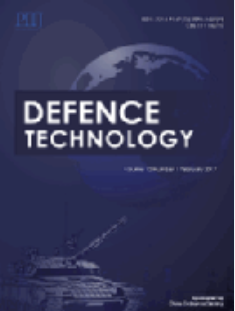Exploring the hygroscopic behavior of highly energetic oxidizer ammonium dinitramide (ADN) at different temperatures and humidities using an innovative hygroscopic modeling
IF 5
Q1 ENGINEERING, MULTIDISCIPLINARY
引用次数: 0
Abstract
Ammonium dinitramide (ADN) is a new type of green energetic oxidizer with excellent energy density and low pollution combustion characteristics. However, the strong hygroscopicity has a significant impact on its practical application. To assist in the research on moisture-proof modification of ADN materials, an innovative hygroscopic modeling approach was proposed to evaluate the hygroscopicity of ADN at various temperatures and humidities. By investigating the diffusion coefficient of water molecules in molecular dynamics processes, a visual insight into the hygroscopic process of ADN was gained. Furthermore, analyzing the non-covalent interactions between ADN and water molecules, the hygroscopicity of ADN could be evaluated qualitatively and quantitatively. The energy analysis revealed that electrostatic forces play a dominant role in the process of water adsorption by ADN, whereas van der Waals forces impede it. As a whole, the simulation results show that ADN presents the following hygroscopic law: At temperatures ranging from 273 K to 373 K and relative humidity (RH) from 10% to 100%, the hygroscopicity of ADN generally shows an increasing trend with the rise in temperature and humidity based on the results of three simulations. According to the non-hygroscopic point (298 K, 52% RH) of ADN obtained by experiment in the literature, a non-hygroscopic range of temperature and humidity for ADN can be depicted when the simulation results in relative hygroscopicity is less than or equal to 17%. This study can provide effective strategies for screening anti-hygroscopic modified materials of ADN.
利用创新吸湿模型探索高能氧化剂二硝胺铵(ADN)在不同温度和湿度下的吸湿行为
二硝胺铵(ADN)是一种新型绿色高能氧化剂,具有优异的能量密度和低污染燃烧特性。然而,强烈的吸湿性对其实际应用有很大影响。为了帮助研究 ADN 材料的防潮改性,研究人员提出了一种创新的吸湿性建模方法,用于评估 ADN 在不同温度和湿度下的吸湿性。通过研究分子动力学过程中水分子的扩散系数,可以直观地了解 ADN 的吸湿过程。此外,通过分析 ADN 与水分子之间的非共价相互作用,可以定性和定量地评估 ADN 的吸湿性。能量分析表明,静电力在 ADN 吸附水的过程中起主导作用,而范德华力则阻碍吸附。总的来说,模拟结果表明 ADN 呈现出以下吸湿规律:在温度为 273 K 至 373 K 和相对湿度(RH)为 10% 至 100% 的条件下,根据三次模拟结果,ADN 的吸湿性一般会随着温度和湿度的升高而呈上升趋势。根据文献中通过实验得到的 ADN 的非吸湿点(298 K,52% RH),当模拟结果中的相对吸湿性小于或等于 17% 时,可以描绘出 ADN 的非吸湿温度和湿度范围。这项研究可为筛选 ADN 的抗吸湿改性材料提供有效策略。
本文章由计算机程序翻译,如有差异,请以英文原文为准。
求助全文
约1分钟内获得全文
求助全文
来源期刊

Defence Technology(防务技术)
Mechanical Engineering, Control and Systems Engineering, Industrial and Manufacturing Engineering
CiteScore
8.70
自引率
0.00%
发文量
728
审稿时长
25 days
期刊介绍:
Defence Technology, a peer reviewed journal, is published monthly and aims to become the best international academic exchange platform for the research related to defence technology. It publishes original research papers having direct bearing on defence, with a balanced coverage on analytical, experimental, numerical simulation and applied investigations. It covers various disciplines of science, technology and engineering.
 求助内容:
求助内容: 应助结果提醒方式:
应助结果提醒方式:


